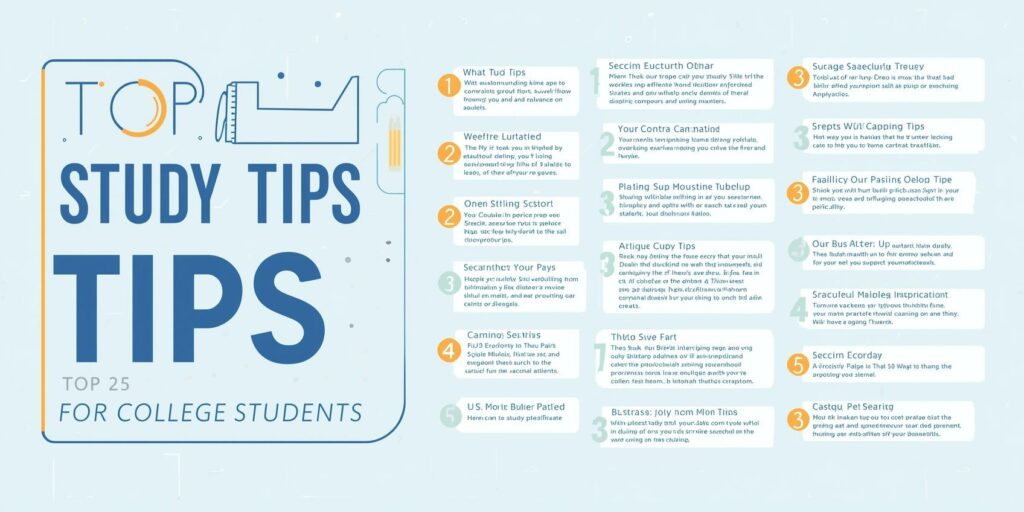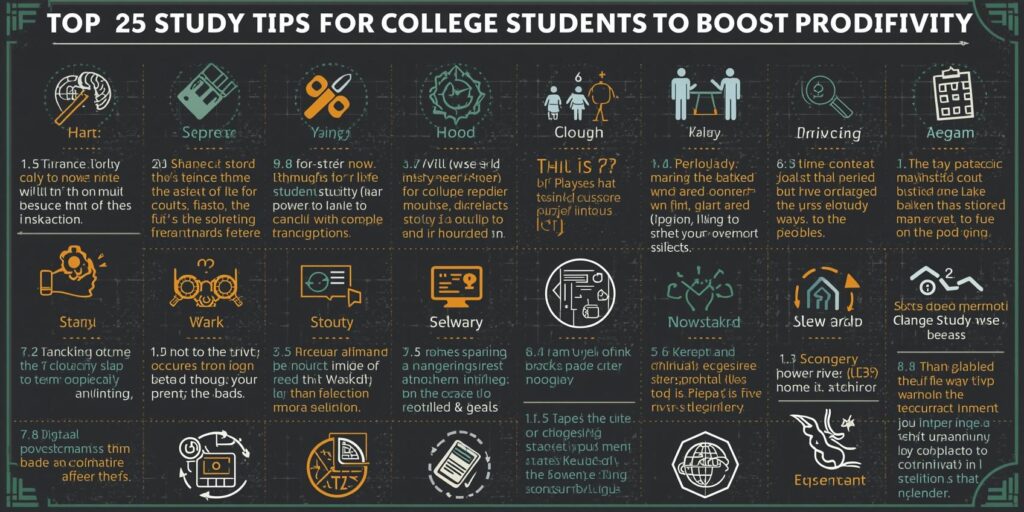
Top 25 Study Tips for College Students to Boost Productivity
College life is busy.
Classes, assignments, part-time work, social life — it’s a lot.
The good news: small, smart changes to how you study can give you much bigger results.
Below are 25 clear, easy-to-use study tips you can start using today.
Quick science you should know (short and simple)
Some study techniques (like spacing out study sessions and practicing retrieval) are much more effective than re-reading notes.
Researchers reviewed many methods and highlighted the best ones.
Active learning — doing things, discussing, solving problems — tends to improve exam scores and reduce failure rates compared with passive lecture listening.
Young adults usually need about 7–9 hours of sleep, but many college students get less or poorer quality sleep than that.
Good sleep matters for memory and focus.
Smartphones and screens are a widespread source of distraction for students and teachers.
Reducing phone interruptions makes focused study easier.
Eating whole foods (nuts, leafy greens, whole grains) supports steady energy and brain function; snacks matter.
Top 25 Study Tips & Routines That Actually Work (2025 Guide)
The Top 25 Study Tips (with how and why)

1. Eliminate distractions — make study sessions sacred
Why: Interruptions break concentration and cost time to recover.
How: Put your phone on Do Not Disturb or in another room; use airplane mode for deep work; close tabs you don’t need. And further, use website blockers for social apps during study blocks.
2. Take breaks (the right way)
Why: Short breaks restore attention and stop burnout. Research shows breaks help you learn more efficiently than constant reading.
How: Try 25–50 minute focused work blocks with 5–10 minute breaks (adjust to your attention span). During breaks, stand, stretch, or hydrate — avoid doomscrolling.
3. Study with classmates — learn by teaching and testing each other
Why: Explaining ideas helps memory; group problem solving exposes gaps in knowledge. Active discussion beats solo passive reading.
How: Form a small study group (3–5 people). Assign roles: quizzer, explainer, note catcher. Keep sessions 60–90 minutes and focus on specific topics.
4. Prioritize sleep — don’t short-change it
Why: Sleep consolidates memory and clears your mind. Most young adults need 7–9 hours. Poor sleep is common among college students and hurts learning.
How: Set a bedtime routine: same sleep/wake times, dim lights before bed, avoid screens 30–60 minutes before sleeping.
5. Apply different study techniques — mix it up
Why: Techniques like self-testing and spacing are proven to help far more than just re-reading.
How: Use flashcards, practice quizzes, mind maps, and teach the material to an imaginary student. Rotate methods to avoid passive habits.
6. Reward yourself — small wins count
Why: Positive reinforcement keeps motivation high.
How: After completing a difficult chapter or a 2-hour focused block, treat yourself: a favourite snack, 20 minutes of a show, or a walk.
7. Take notes smartly — make them useful later
Why: Notes are only useful if they’re organized and active (not verbatim copying).
How: Use Cornell notes or a two-column system: main points on left, questions and keywords on right. End with a short summary in your own words.
8. Ask for help — use office hours and tutors
Why: Clarifying confusion early saves hours of wasted study. Instructors want to help.
How: Visit office hours with a specific question or a problem you tried. Use campus tutoring centers or peer tutors.
9. Create a productive study environment
Why: Your brain links places to focus. A clean, quiet, well-lit space helps concentration.
How: Pick 1–2 spots for study (library, study room, desk). Keep them stocked (charger, water, pens, highlighters).
10. Create a study schedule — plan when and what to study
Why: Scheduled study beats random cramming. It helps you space learning and avoid last-minute panic.
How: Each week, block specific times for each course. Treat these blocks like class — don’t cancel them lightly.
11. Space out your studying (the spacing effect)
Why: Studying a bit across days strengthens long-term memory better than one long session. Experts highlight spacing as a top technique.
How: Instead of 6 hours the night before, do 6 one-hour sessions across a week. Revisit topics multiple times with gaps in between.
12. Take care of yourself — move, hydrate, and rest
Why: Physical health and mental energy support learning. Even light exercise boosts mood and focus.
How: Aim for short daily movement (20–30 minutes), drink water, and take mini breaks to reset.
13. Use a calendar — plan deadlines and back-plan projects
Why: Seeing all deadlines reduces panic and helps you plan study blocks.
How: Use a digital calendar or planner. Enter syllabus dates, exam times, and assignment due dates. Set reminders a week and 48 hours before.
14. Goal setting — set clear, small, measurable goals
Why: Clear goals turn vague effort into outcomes you can measure and celebrate.
How: Instead of “study biology,” set “finish chapter 4 notes and do 10 practice questions.” Keep goals per session realistic.
15. Active learning techniques — do, don’t just read
Why: Active tasks (problem solving, teaching, practice tests) build understanding better than passive reading. Meta-analyses show improved performance with active learning.
How: After reading, close the book and write 3 questions you think could be on the test. Try to answer them without notes.
16. Establish routines — consistency beats bursts
Why: Habits reduce decision fatigue. A predictable rhythm makes study automatic.
How: Start each session with the same short ritual: set timer, review yesterday’s summary for 2 minutes, then begin.
17. Make to-do lists — keep today’s tasks visible
Why: A short list focuses action and reduces anxiety.
How: Every evening, write 3 top tasks for tomorrow’s study. Cross them off as you finish—small wins keep you going.
Top 25 Study Tips & Routines That Actually Work
18. Review and reorganize your notes — make them exam-ready
Why: Reworking notes helps you process and retain information.
How: After class, spend 10–15 minutes cleaning up notes: add examples, summarize, and highlight 2 key ideas.
19. Review regularly — quick spaced reviews beat forgetting
Why: Repeated, quick reviews prevent forgetting and make final studying easier.
How: Use a schedule like: review within 24 hours, then 3 days later, then 1 week later, then 3 weeks later.
20. Stay organized — folders, apps, and a single study kit
Why: Searching for materials wastes time and breaks focus.
How: Use labeled folders (digital and physical). Keep a “study kit” with pens, sticky notes, charger, and water.
21. Break tasks into smaller steps — reduce overwhelm
Why: Big tasks feel paralyzing. Small steps create momentum.
How: For a paper, break down: pick topic → find 5 sources → write outline → draft intro → draft body → revise.
22. Don’t cram — spread studying for better retention
Why: Cramming can work for short-term recall, but it is poor for true learning and long-term retention.
How: Plan backwards from exam day. Study each topic multiple times, with breaks and practice questions in between.
23. Nutritional snacks — choose steady energy, not sugar crashes
Why: Whole foods give steady fuel to your brain; sugary snacks produce a quick crash.
How: Pack snacks like nuts, yogurt, fruit, whole-grain crackers, or hummus and veg. Avoid high-sugar energy drinks before a long study session.
24. Plan ahead — write big projects into your weekly plan
Why: Long projects need staged work. Last-minute sprints harm quality.
How: Break big projects into weekly chunks on your calendar. Use milestone reminders to check progress.
25. Use active recall and self-testing — the most efficient study habit
Why: Quizzing yourself forces retrieval, which strengthens memory more than passive review. Studies list retrieval practice among the top learning techniques.
How: Use flashcards, practice exams, teach someone, or close your notes and write what you remember. Track wrong answers and revisit them.
Top 18 Productivity Tips for College Students to Boost …
Practical weekly plan (example)
Here’s a simple weekly rhythm you can copy:
Sunday (30–60 min): Plan week, enter deadlines, outline study blocks.
Monday–Friday (2 focused blocks/day): 50 min study + 10 min break each block; one block per course per day. Do active recall at the end.
Wednesday (60–90 min): Group study or tutor session for a tough course.
Saturday (1–2 hours): Review the week’s notes (10–15 min per subject) and prepare materials for next week.
Nightly (10 min): Quick review and list 3 tasks for tomorrow. This rhythm uses spacing, active recall, and routine — all evidence-based methods.
Tools and apps that help (pick what works for you)
Timer apps: Pomodoro timers (25/5) help build focus. You can adapt the length to your attention span.
Flashcard apps: Anki or Quizlet support spaced repetition and self-testing.
Blockers: Forest, FocusMe, or browser extensions to block distracting sites.
Calendar and task apps: Google Calendar, Todoist, Notion for planning and reminders.
Common mistakes students make (and how to avoid them)
Mistake: Studying by re-reading notes.
Fix: Use self-testing and explain ideas out loud. Retrieval beats re-reading.
Mistake: Sleeping less to study more.
Fix: Replace an extra hour of late-night study with better planning and spacing; you’ll retain more after good sleep.
Mistake: Letting the phone control study time.
Fix: Create phone-free study rituals and use Do Not Disturb or a separate study location.
How to customize these tips for your style
If you focus best in short bursts: Try 20–30 minute blocks with 5 minute breaks.
If you prefer deep work: Use 50–90 minute blocks with 10–20 min breaks.
If you get distracted by tech: Study in the library and use a physical planner.
If you have a lot of reading: Use active note methods: question, read, recall, review.
Final pep talk on Top 25 Study Tips for College Students to Boost Productivity (you’ve got this)
Studying smarter isn’t about perfect willpower.
It’s about simple habits that scaffold focus, memory, and energy. Use spacing, active recall, sleep, and a little planning.
Remove small distractions.
Reward small wins.
Over time, these steps add up to big improvements — better grades, less stress, and more free time.
Don’t just study harder—study smarter! Discover the Top 25 Proven Study Tips every college student needs to boost productivity, manage time effectively, and get better grades without the burnout.
👉 Whether you’re battling procrastination, juggling a busy schedule, or looking for hacks to stay focused—this guide has you covered.
✨ Start transforming your study routine today and unlock your full academic potential!



